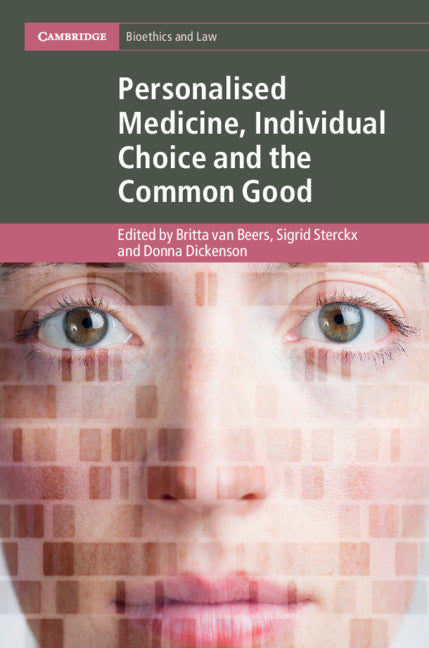Freshly Printed - allow 4 days lead
Couldn't load pickup availability
Personalised Medicine, Individual Choice and the Common Good
Asks whether personalised medicine is superior to 'one-size-fits-all' treatment. Does it elevate individual choice above the common good?
Britta van Beers (Edited by), Sigrid Sterckx (Edited by), Donna Dickenson (Edited by)
9781108473910, Cambridge University Press
Hardback, published 22 November 2018
320 pages, 1 b/w illus.
23.5 x 15.6 x 2 cm, 0.58 kg
'The multidisciplinary perspectives offered in this book will make it of interest to a variety of audiences, especially bioethics, law, and philosophy students and academics. It will also be of interest to other scholars studying the intersection of medicine, society, and politics, such as political scientists and communications experts.' Maya Sabatello, Hastings Center Report
Hippocrates famously advised doctors 'it is far more important to know what person the disease has than what disease the person has'. Yet 2,500 years later, 'personalised medicine', based on individual genetic profiling and the achievements of genomic research, claims to be revolutionary. In this book, experts from a wide range of disciplines critically examine this claim. They expand the discussion of personalised medicine beyond its usual scope to include many other highly topical issues, including: human nuclear genome transfer ('three-parent IVF'), stem cell-derived gametes, private umbilical cord blood banking, international trade in human organs, biobanks such as the US Precision Medicine Initiative, direct-to-consumer genetic testing, health and fitness self-monitoring. Although these technologies often prioritise individual choice, the original ideal of genomic research saw the human genome as 'the common heritage of humanity'. The authors question whether personalised medicine actually threatens this conception of the common good.
1. Introduction to Personalised Medicine, Individual Choice and the Common Good Donna Dickenson, Britta van Beers and Sigrid Sterckx
2. Personalised medicine and the politics of human nuclear genome transfer Françoise Baylis and Alana Cattapan
3. Stem cell derived gametes and uterus transplants: hurray for the end of third party reproduction! Or not? Heidi Mertes
4. Personalising future health risk through 'biological insurance': proliferation of private umbilical cord blood banking in India Jyotsna Gupta
5. Combating the trade in organs: why we should preserve the communal nature of organ transplantation Kristof Van Assche
6. When there is no cure: challenges for collective approaches to Alzheimer's disease Robin Pierce
7. Lost and found: relocating the individual in the age of intensified data sourcing in European healthcare Klaus Hoeyer
8. Presuming the promotion of the common good by large-scale health research: the cases of care.data 2.0 and the 100,000 Genomes Project in the UK Sigrid Sterckx, Sandi Dheensa and Julian Cockbain
9. My genome, my right Stuart Hogarth, Julian Cockbain and Sigrid Sterckx
10. 'The best me I can possibly be': legal subjectivity, self-authorship and wrongful life actions in an age of 'genomic torts' Britta van Beers
11. I run, you run, we run: a philosophical approach to health and fitness apps Marli Huijer and Christian Detweiler
12. The molecularised me: psychoanalysing personalised medicine and self-tracking Hub Zwart.
Subject Areas: Bio-ethics [PSAD], Forensic medicine [MMQ], Medical sociology [MBS], Epidemiology & medical statistics [MBNS], Medical ethics & professional conduct [MBDC], Medical & healthcare law [LNTM]


